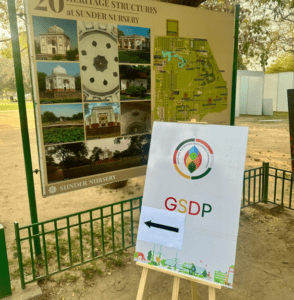The German Embassy, in partnership with the Federal Ministry for Economic Cooperation and Development (BMZ), launched the inaugural ‘GSDP Conversation Series’ at Sunder Nursery Park in New Delhi on March 22, 2024. This initiative signifies a significant step in advancing the Indo-German Partnership for Green and Sustainable Development (GSDP).
Key Topics Discussed
During the inaugural event, key topics such as green energy, urban sustainability, and climate resilience were discussed. There was a specific focus on countries such as Cameroon, Peru, Ghana, Benin, and Malawi.
Triangular Cooperation and Its Significance
The first edition of the GSDP Conversation Series highlighted triangular cooperation, where India and Germany collaborate with third countries to address global environmental challenges with localized solutions. This approach is rooted in the agreement signed by Prime Minister Narendra Modi and German Chancellor Olaf Scholz on May 2, 2022. It underscores the importance of joint efforts in tackling climate change and promoting sustainable development.
The GSDP Strategic Priorities
The GSDP aims to strengthen cooperation between India and Germany in alignment with global climate goals and the Sustainable Development Goals (SDGs). The strategic priorities of the GSDP include:
Green Energy Transition:
Fostering sustainable energy solutions, including renewables, energy efficiency, grid integration, storage, and green hydrogen. The two countries will also work closely to boost manufacturing capabilities.

Sustainable Urban Development:
Building inclusive, climate-friendly cities with a focus on water, sanitation, waste management, and urban planning. Green Mobility: Supporting efficient, low-carbon urban transportation and promoting wider use of electric vehicles.
Climate Change:
Pursuing ambitious climate goals under the Paris Agreement, with a focus on reducing greenhouse gas emissions and enhancing resilience. Biodiversity and Forest Restoration: Collaborating to restore forest landscapes, protect biodiversity, and create sustainable livelihoods.
Agroecology and Natural Resource Management:
Transforming agriculture and food systems towards sustainability based on agroecological principles. The partnership aims at building healthy agroecosystems, while providing safe and nutritious food for all.
Marine Litter:
Monitoring and preventing litter in marine ecosystems, with an emphasis on reducing plastic waste and improving waste management.
Circular Economy:
Boosting innovative business models to reduce waste like single-use plastics, design reusable products, and recycle materials. Across these priority areas, India and Germany are also committed to the principles of gender equality and women-led development.
Bilateral Cooperation between India and Germany
India and Germany collaborate on concrete technical and financial cooperation projects in the strategic priority areas of the GSDP. The Indo-German Energy Forum (IGEF) and the Indo-German Environment Forum (IGEnvF) facilitate dialogue and cooperation on sustainable energy, renewable technologies, environmental challenges, and international climate policy.
Trilateral and Multilateral Cooperation
The GSDP extends its impact globally through trilateral and multilateral cooperation. India and Germany collaborate with countries in Asia, Africa, and the Indo-Pacific region to support sustainable development and achieve climate targets. Both nations also support multilateral initiatives such as the International Solar Alliance (ISA) and the InsuResilience Global Partnership.
Inclusive and Holistic Partnership
The GSDP has been adopted at the highest level by Prime Minister Narendra Modi and Chancellor Olaf Scholz, reflecting an all-of-government approach. The partnership engages government officials, business leaders, civil society organizations, researchers, and other stakeholders.
The Indo-German Partnership for Green and Sustainable Development, highlighted by the GSDP Conversation Series, signifies a joint commitment to addressing global challenges. It underscores the importance of shared solutions and collaboration in achieving sustainable development and countering the adverse effects of climate change.
Click Here For More Information
FAQ’s
- What is the GSDP Conversation Series?
- The GSDP Conversation Series is an initiative launched by the German Embassy, in partnership with the Federal Ministry for Economic Cooperation and Development (BMZ), to advance the Indo-German Partnership for Green and Sustainable Development.
- What were the key topics discussed during the inaugural event?
- The key topics discussed during the inaugural event included green energy, urban sustainability, and climate resilience, with a specific focus on countries such as Cameroon, Peru, Ghana, Benin, and Malawi.
- What is triangular cooperation, and why is it significant?
- Triangular cooperation involves collaboration between India, Germany, and third countries to address global environmental challenges with localized solutions. It is significant because it allows for joint efforts in tackling climate change and promoting sustainable development.
- What are the strategic priorities of the GSDP?
- The strategic priorities of the GSDP include green energy transition, sustainable urban development, green mobility, climate change, biodiversity and forest restoration, agroecology and natural resource management, marine litter, and circular economy.
- How do India and Germany collaborate on sustainable development?
- India and Germany collaborate on concrete technical and financial cooperation projects in areas such as sustainable energy, renewable technologies, environmental challenges, and international climate policy.
- What is the role of bilateral cooperation in the GSDP?
- Bilateral cooperation between India and Germany plays a crucial role in implementing the strategic priorities of the GSDP, fostering dialogue, and supporting concrete projects in areas of mutual interest.
- How does the GSDP extend its impact globally?
- The GSDP extends its impact globally through trilateral and multilateral cooperation, where India and Germany collaborate with countries in Asia, Africa, and the Indo-Pacific region to achieve sustainable development and climate targets.
- Who is involved in the GSDP partnership?
- The GSDP partnership involves government officials, business leaders, civil society organizations, researchers, and other stakeholders from both India and Germany, reflecting an all-of-government approach.
- Where can I find more information about the GSDP?
- For the latest developments and information on the GSDP, you can explore the GSDP Conversation Series, visit the dedicated GSDP website and dashboard launching in 2024, and connect with the German Embassy in India.
- How often will the GSDP Conversation Series be held?
- The GSDP Conversation Series will proceed with sessions held in different Indian cities six times annually, providing opportunities for ongoing dialogue and engagement.










